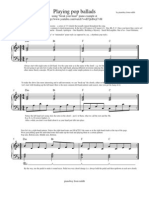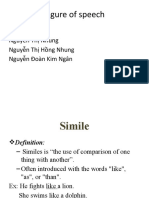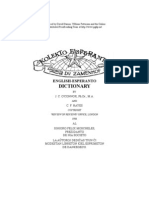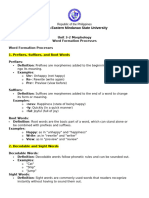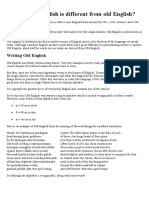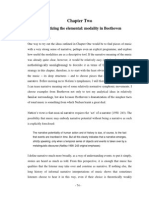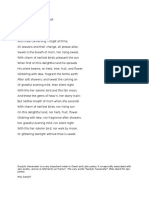0 ratings0% found this document useful (0 votes)
260 viewsParafrase
Parafrase
Uploaded by
Sendy VanillaThe document discusses paraphrasing and provides suggestions for writing a paraphrase. It defines paraphrasing as rewriting a passage in different words without changing the meaning. It notes that special terms and names should typically not be changed. The document also provides an example of paraphrasing a passage about the creation of artificial languages.
Copyright:
© All Rights Reserved
Available Formats
Download as PPTX, PDF, TXT or read online from Scribd
Parafrase
Parafrase
Uploaded by
Sendy Vanilla0 ratings0% found this document useful (0 votes)
260 views7 pagesThe document discusses paraphrasing and provides suggestions for writing a paraphrase. It defines paraphrasing as rewriting a passage in different words without changing the meaning. It notes that special terms and names should typically not be changed. The document also provides an example of paraphrasing a passage about the creation of artificial languages.
Original Description:
Mata Kuliah : Bahasa Inggris Lanjut
Copyright
© © All Rights Reserved
Available Formats
PPTX, PDF, TXT or read online from Scribd
Share this document
Did you find this document useful?
Is this content inappropriate?
The document discusses paraphrasing and provides suggestions for writing a paraphrase. It defines paraphrasing as rewriting a passage in different words without changing the meaning. It notes that special terms and names should typically not be changed. The document also provides an example of paraphrasing a passage about the creation of artificial languages.
Copyright:
© All Rights Reserved
Available Formats
Download as PPTX, PDF, TXT or read online from Scribd
Download as pptx, pdf, or txt
0 ratings0% found this document useful (0 votes)
260 views7 pagesParafrase
Parafrase
Uploaded by
Sendy VanillaThe document discusses paraphrasing and provides suggestions for writing a paraphrase. It defines paraphrasing as rewriting a passage in different words without changing the meaning. It notes that special terms and names should typically not be changed. The document also provides an example of paraphrasing a passage about the creation of artificial languages.
Copyright:
© All Rights Reserved
Available Formats
Download as PPTX, PDF, TXT or read online from Scribd
Download as pptx, pdf, or txt
You are on page 1of 7
Paraphrasing
The paraphrase is a writing skill in which the
passage rewritten in different words (kata
yang dibuat sendiri oleh orang yang membuat
paraphrase) without changing the meaning.
Paraphrasing is done for reshaping source
material to suit ones purposes and aims. Its a
free rendering of the sense of a passage, fully
and proportionately, but in different words.
The result or process of producing alternative versions of
a sentence or a text without changing the meaning.
(Crystal, 1985; 220-221)
Hasil atau proses memproduksi beberapa alternatif dari
sebuah kalimat atau teks tanpa perubahan makna.
Richards (1992:264) parafrase adalah mengungkapkan
kembali makna sebuah kata atau frase dengan cara
menggunakan kata-kata atau frase yang lain untuk
memperjelas makna agar lebih mudah dipaham.
The suggestions for writing :
1. Read the original passage carefully.
(Bacalah tulisan dengan cermat)
2. Notice the special words such as scientific terms, persons name,
name of place, etc. They are no need to change. (Perhatikan kata-
kata khusus terutama peristilahan keilmuan, nama orang, nama
tempat, dll. Kata-kata tersebut biasanya tidak perlu diganti dengan
sinonimnya.)
3. Identify the special words used by the writer. They are need to be
changed by the synonymous.
(Identifikasi kata-kata khusus yang dipakai oleh penulis. Biasanya kita
perlu mengganti dengan sinonimnya.)
4. Write down the outline.
(Tuliskan outline terlebih dahulu (garis besar tulisan beserta pokok
pikirannya)
5. Write the paraphrase, using the own words and state the meaning
of the main idea.
The Original
since the time of Descartes, it is estimated that
no fewer than five hundred attempts have
been made to create artificial languages for
international use. The most successful by far
has been Esperanto, a language constructed
around the end of the nineteenth century by
Dr. Zamenhof of Poland. Esperanto is a
language that is extremely easy to learn and
speak, with its words drawn mainly from
English, German, the Romance languages,
Latin and Greek. (Pei, p.175)
The Paraphrase
Since the early nineteenth century, approximately
five hundred artificial languages have been
created for international communication.
Esperanto, a language invented around the end of
the nineteenth century in Poland by a man
named Dr. Zamenhof, has been the most
successful. Esperanto is very easy to learn and
speak. Its vocabulary comes from English,
German, the Romance languages, Latin and
Greek. (Pei, p.175)
Men and Machines
One great defect of our civilization is that it does not know what to
do with its knowledge. Science, as we have seen, has given us
powers fit for the gods, yet we use them like small children.
For example, we do not know how to manage our machines.
Machines were made to be mans servants; yet he has grown so
dependent on them that they are in a fair way to become his
masters. Already most men spend most of their lives looking after
and waiting upon machines. And the machines are very stern
masters. They must be fed with coal, and given petrol to drink, and
oil to wash with, and must be kept at the right temperature. And if
they do not get their meals when they expect them, they grow
sulky and refuse to work, or burst with rage, and blow up, and
spread ruin and destruction all round them. So we have to wait
upon them very attentively and do all that we can to keep them in a
good temper. Already we find it difficult either to work or play
without the machines, and a time may come when they will rule us
altogether, just as we rule the animals. (C.E.M. Joad)
Men and Machines
We do not know what to do with our knowledge.
Science has given us superhuman powers, which
we do not use it properly.
For instance, we are unable to manage our
machines. They were made as our servants but
they often become masters. We must serve
them. They should be fed with fuel and
maintained at the good condition; otherwise they
refuse to work or cause destruction. We wait and
keep them attentively. We already find it difficult
to do without machines. In the course of time
they may rule over us altogether. (C.E.M. Joad)
You might also like
- Cpsu Entrance Exam Possible Lesson - WPS OfficeDocument9 pagesCpsu Entrance Exam Possible Lesson - WPS OfficeRommel Samonte Alonzagay100% (3)
- Gouache For Illustration Rob Howard DownloadDocument3 pagesGouache For Illustration Rob Howard DownloadEricka0% (4)
- Playing Pop BalladsDocument7 pagesPlaying Pop Balladspianoboytest100% (10)
- Meeting 3 - Word Classes (Noun, Pronoun, Adjective)Document21 pagesMeeting 3 - Word Classes (Noun, Pronoun, Adjective)Laut SamudraNo ratings yet
- English Grammer and Composition NotesDocument5 pagesEnglish Grammer and Composition NotesRaheel WaqasNo ratings yet
- Figure of speech: Group 4: Nguyễn Thị Nhung Nguyễn Thị Hồng Nhung Nguyễn Đoàn Kim NgânDocument26 pagesFigure of speech: Group 4: Nguyễn Thị Nhung Nguyễn Thị Hồng Nhung Nguyễn Đoàn Kim Ngândoanngan044No ratings yet
- General English - Part 4 - Writing - Parts of Speech and Phrases-SBUDocument16 pagesGeneral English - Part 4 - Writing - Parts of Speech and Phrases-SBUParsaNo ratings yet
- Main Slide DeterminerDocument10 pagesMain Slide DeterminerSM TANVIR AHAMMADNo ratings yet
- Summarizing and ParaphrasingDocument12 pagesSummarizing and ParaphrasingNur HafsaNo ratings yet
- explainingDocument5 pagesexplainingnisreen raNo ratings yet
- Reading Practice Set - Final Version With Answer KeyDocument150 pagesReading Practice Set - Final Version With Answer Keyilmi100% (1)
- ปรับพื้นฐาน ม.1 2Document16 pagesปรับพื้นฐาน ม.1 22.31เขมิกา บุญลือNo ratings yet
- EnglishDocument63 pagesEnglishkhxthqs56yNo ratings yet
- Modul BHS - Ing.sem (2021)Document29 pagesModul BHS - Ing.sem (2021)Han ArdiansyahNo ratings yet
- Modul Bhs - Ing.sem (2021)Document29 pagesModul Bhs - Ing.sem (2021)Han ArdiansyahNo ratings yet
- 308 Subject-Pred AgreementDocument9 pages308 Subject-Pred AgreementGabuu25No ratings yet
- Study Guide Fourth GradeDocument17 pagesStudy Guide Fourth Gradeinmartinez1No ratings yet
- Children's Grace of Mary Tutorial and Learning Center, Inc: New Carmen, Tacurong CityDocument4 pagesChildren's Grace of Mary Tutorial and Learning Center, Inc: New Carmen, Tacurong CityJa NeenNo ratings yet
- g8 English Notes FVTVLFDocument234 pagesg8 English Notes FVTVLFlanyvaluddu3No ratings yet
- Proper NounDocument8 pagesProper Nounpsomeswari4No ratings yet
- JS2 English FTDocument14 pagesJS2 English FTlordiwegbuNo ratings yet
- Etymological Background of The English VocabularyDocument13 pagesEtymological Background of The English VocabularyАкбота АманжолNo ratings yet
- J.C. OConnor - English-Esperanto DictionaryDocument376 pagesJ.C. OConnor - English-Esperanto DictionaryRusty St JeffordsNo ratings yet
- INGLEEEESDocument3 pagesINGLEEEESAndres BarbozaNo ratings yet
- Basic EnglishDocument41 pagesBasic EnglishMuhammad Mubeen Iqbal PuriNo ratings yet
- Basic 7 First Term English Lang.Document41 pagesBasic 7 First Term English Lang.praisechibiko1925No ratings yet
- English Notes Form 1-4 Booklet FinalestyDocument520 pagesEnglish Notes Form 1-4 Booklet FinalestySophia OywerNo ratings yet
- Esperanto DictionaryDocument188 pagesEsperanto Dictionaryvenky1134100% (1)
- 1ST Term J1 English LanguageDocument37 pages1ST Term J1 English Languagedavidmadu82No ratings yet
- English Notes Form 1-4 Booklet New SetbksDocument573 pagesEnglish Notes Form 1-4 Booklet New SetbksBadmind Jnr100% (3)
- 6.essays Description Personal Narrative and TravelogueDocument11 pages6.essays Description Personal Narrative and Traveloguesilwalprabhakar77No ratings yet
- w2 ParaphrasingDocument16 pagesw2 ParaphrasingTrần Thuỳ Dương100% (1)
- Properties of A Well Written TextDocument38 pagesProperties of A Well Written TextChryzhllGelveroGuerreroNo ratings yet
- English Esperanto DictionaryDocument170 pagesEnglish Esperanto DictionaryDor ShlushNo ratings yet
- 6 CharacteristicDocument24 pages6 CharacteristicQuyên NguyễnNo ratings yet
- Unit 3 2 Morphology Word Formation ProcessesDocument11 pagesUnit 3 2 Morphology Word Formation Processesgjester797No ratings yet
- Lesson Note On English Language Jss1 First TermDocument63 pagesLesson Note On English Language Jss1 First TermmaudofunmilayoNo ratings yet
- Genres of TextsDocument4 pagesGenres of TextstehithaNo ratings yet
- 1ST Term J1 English LanguageDocument35 pages1ST Term J1 English LanguagePeter Omovigho Dugbo100% (1)
- G 8 English Complete Notes For Junior SecDocument50 pagesG 8 English Complete Notes For Junior SecBashirNo ratings yet
- Pronouns: DosenDocument16 pagesPronouns: DosenBaraNo ratings yet
- Word Classes and Phrase ClassesDocument15 pagesWord Classes and Phrase ClassesElvin Ng Chi KinNo ratings yet
- J C o Connor English Esperanto DictionaryDocument321 pagesJ C o Connor English Esperanto Dictionarymohdkasim7862002100% (1)
- Using Strategies To Empower Writing Skills: Colegio Trener English DepartmentDocument46 pagesUsing Strategies To Empower Writing Skills: Colegio Trener English DepartmentMarianita RosasNo ratings yet
- Noun Lecture1Document6 pagesNoun Lecture1362230No ratings yet
- Word Formation ProcessesDocument4 pagesWord Formation ProcessesMacwin KiatNo ratings yet
- Speech Work - Introduction To Speech (Organs of Speech), Grammar - Parts of Speech - Nouns,... - ClassNotes - NGDocument9 pagesSpeech Work - Introduction To Speech (Organs of Speech), Grammar - Parts of Speech - Nouns,... - ClassNotes - NGSalaudeen KunleNo ratings yet
- Parts of Speech in EnglishDocument20 pagesParts of Speech in EnglishAyu Putri Masito100% (2)
- ParaphrasingDocument5 pagesParaphrasingFachrur Rozi100% (4)
- Language Arts Sept 16, 2020Document9 pagesLanguage Arts Sept 16, 2020bechamrocky35No ratings yet
- First Term JSS1 English LanguageDocument34 pagesFirst Term JSS1 English LanguageJENNIFER HELPHZIBERNo ratings yet
- NounsDocument17 pagesNounsjohnnorton.academyNo ratings yet
- Compound Adjectives and Hyphenation PDFDocument4 pagesCompound Adjectives and Hyphenation PDFAhmed ElmeligyNo ratings yet
- U 3 Handout 9 Differnt Kinds of Nouns and AdjectivesDocument4 pagesU 3 Handout 9 Differnt Kinds of Nouns and AdjectivesMuhammad Mubasher AliNo ratings yet
- 1_M3_GRAMMAR S1, Complete Course, Pr. ZanzounDocument68 pages1_M3_GRAMMAR S1, Complete Course, Pr. ZanzounÀbdęrrāhîm Baț Øű ŁíNo ratings yet
- English Grammar Free NotesDocument555 pagesEnglish Grammar Free Notesguyo bazuNo ratings yet
- Chapter 4 - Ad Herennium: The Art of Memory: A Latin Anthology For The 21st CenturyDocument10 pagesChapter 4 - Ad Herennium: The Art of Memory: A Latin Anthology For The 21st CenturyEdsonThomaziniNo ratings yet
- ParagraphsDocument18 pagesParagraphsDhiya FarahNo ratings yet
- That Doesn't Mean What You Think It Means: The 150 Most Commonly Misused Words and Their Tangled HistoriesFrom EverandThat Doesn't Mean What You Think It Means: The 150 Most Commonly Misused Words and Their Tangled HistoriesNo ratings yet
- Slips of Speech : a Helpful Book for Everyone Who Aspires to Correct the Everyday Errors of SpeakingFrom EverandSlips of Speech : a Helpful Book for Everyone Who Aspires to Correct the Everyday Errors of SpeakingNo ratings yet
- For Learners of Indian Classical Music SadhanaDocument9 pagesFor Learners of Indian Classical Music SadhanaxiaoboshiNo ratings yet
- Villa Lobos Estudos ViolãoDocument54 pagesVilla Lobos Estudos ViolãoMax Kühn100% (3)
- Bil Dungs RomanDocument7 pagesBil Dungs RomanmarisolNo ratings yet
- Coptic StitchDocument5 pagesCoptic StitchClerenda Mcgrady100% (2)
- How Modern English Is Different From Old EnglishDocument3 pagesHow Modern English Is Different From Old EnglishSuryajeeva Sures100% (1)
- Laura Ingalls Wilder DoilyDocument3 pagesLaura Ingalls Wilder DoilyJulieann50% (2)
- XylophoneDocument3 pagesXylophonedfgrtg454gNo ratings yet
- Patricia HighsmithDocument1 pagePatricia HighsmithCarl RollysonNo ratings yet
- Marasdcin Dylla - JDocument3 pagesMarasdcin Dylla - JAnonymous TL6DhwK8mXNo ratings yet
- NATO Phonetic Alphabet 2015 NGLDocument1 pageNATO Phonetic Alphabet 2015 NGLChristian BigayNo ratings yet
- Chapter Two: Dramatizing The Elemental: Modality in BeethovenDocument39 pagesChapter Two: Dramatizing The Elemental: Modality in BeethovenJioVolkzy100% (1)
- MACABA, Barcelona PDFDocument9 pagesMACABA, Barcelona PDFNicholas SocratesNo ratings yet
- Iannaccone - Sea DriftDocument33 pagesIannaccone - Sea DriftAndrew JanesNo ratings yet
- Test Initial Cls 5, EnglezaDocument2 pagesTest Initial Cls 5, EnglezaEliza SorinaNo ratings yet
- Denis SedovDocument23 pagesDenis SedovCosmina AştefaneiNo ratings yet
- PrepositionsDocument5 pagesPrepositionsBryan LeeNo ratings yet
- Project Floral BraceletDocument2 pagesProject Floral BraceletMaddalena PezzaniNo ratings yet
- Excerpt From Paradise LostDocument4 pagesExcerpt From Paradise Lostcharlene robanteNo ratings yet
- Past Tense Marking in AfrikaansDocument1 pagePast Tense Marking in AfrikaansMarcus Amadeus von BergenNo ratings yet
- Connected Speech HandoutDocument4 pagesConnected Speech HandoutAnonymous nuA1PrwLzUNo ratings yet
- SlouchingreadingscheduleDocument2 pagesSlouchingreadingscheduleapi-288676741No ratings yet
- 13first Language AcquisitionSP08Document23 pages13first Language AcquisitionSP08OmerNo ratings yet
- Mapeh 8 Long Test 2nd QTRDocument6 pagesMapeh 8 Long Test 2nd QTRIceyYamahaNo ratings yet
- L3 Passive Active Batna 2Document3 pagesL3 Passive Active Batna 2Yac IneNo ratings yet
- French 1Document164 pagesFrench 1Sofia D'AlessandroNo ratings yet
- Review Ten: Phatik Chand, A Book ReviewDocument2 pagesReview Ten: Phatik Chand, A Book ReviewakhilaseshadriNo ratings yet
- Cazurile in LB FinlandezaDocument5 pagesCazurile in LB FinlandezaTeodora ChivuNo ratings yet
- Presentation 1Document11 pagesPresentation 1asma m aNo ratings yet


